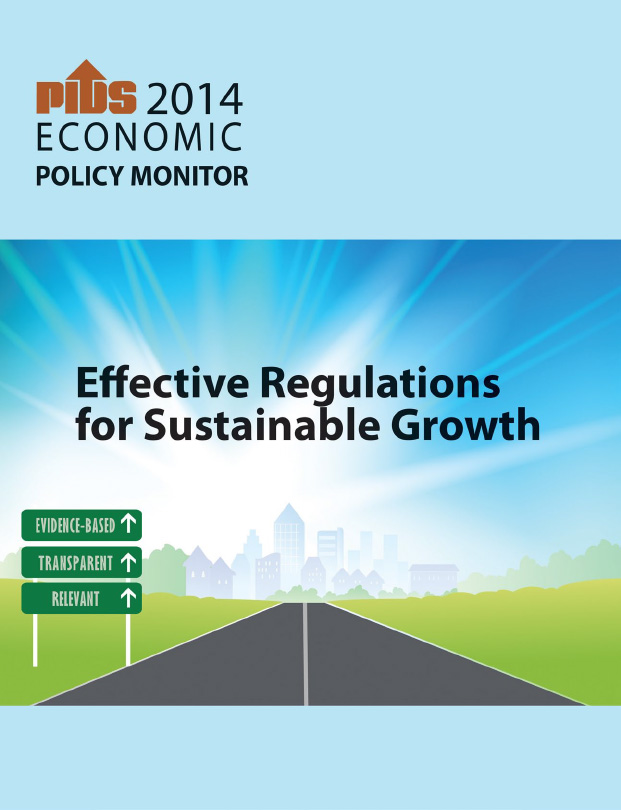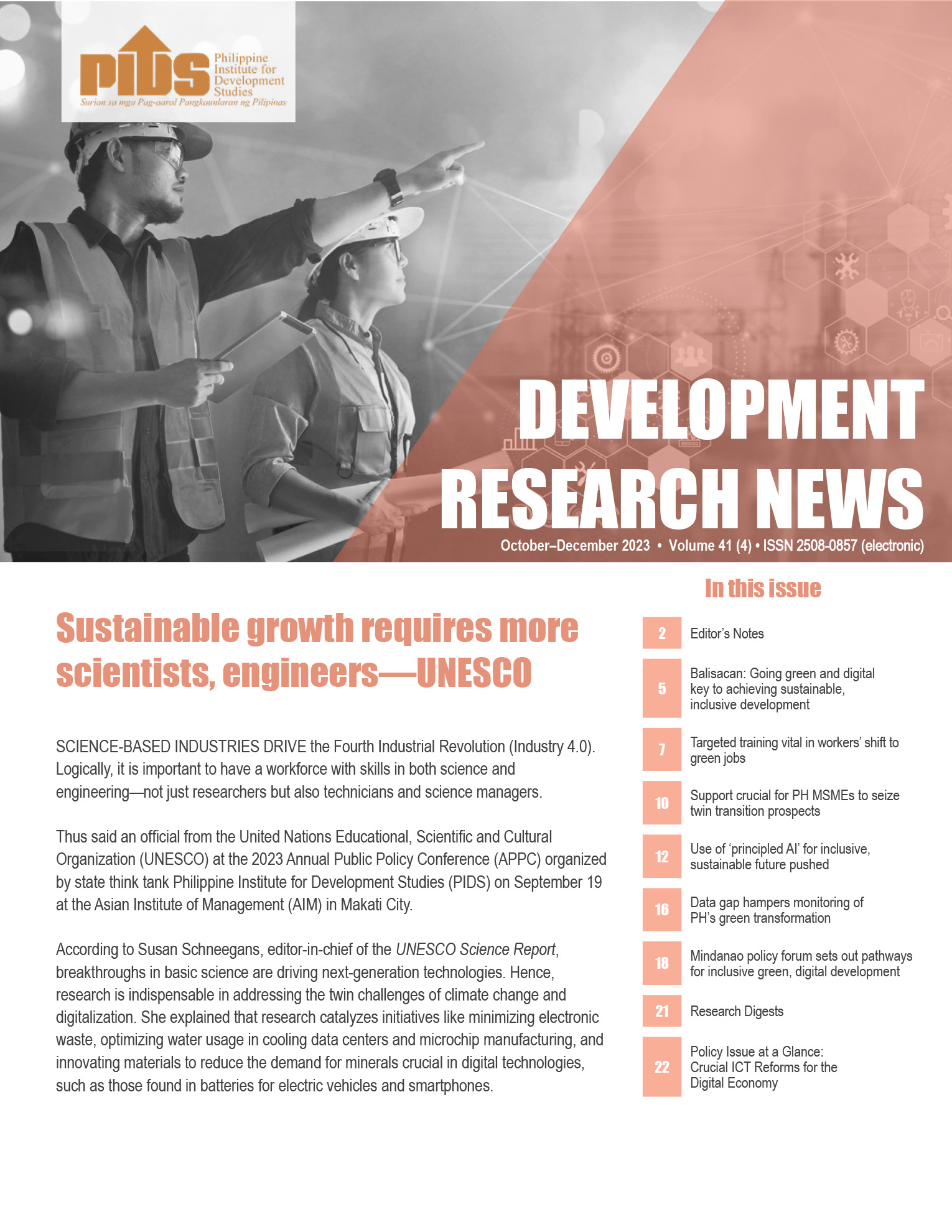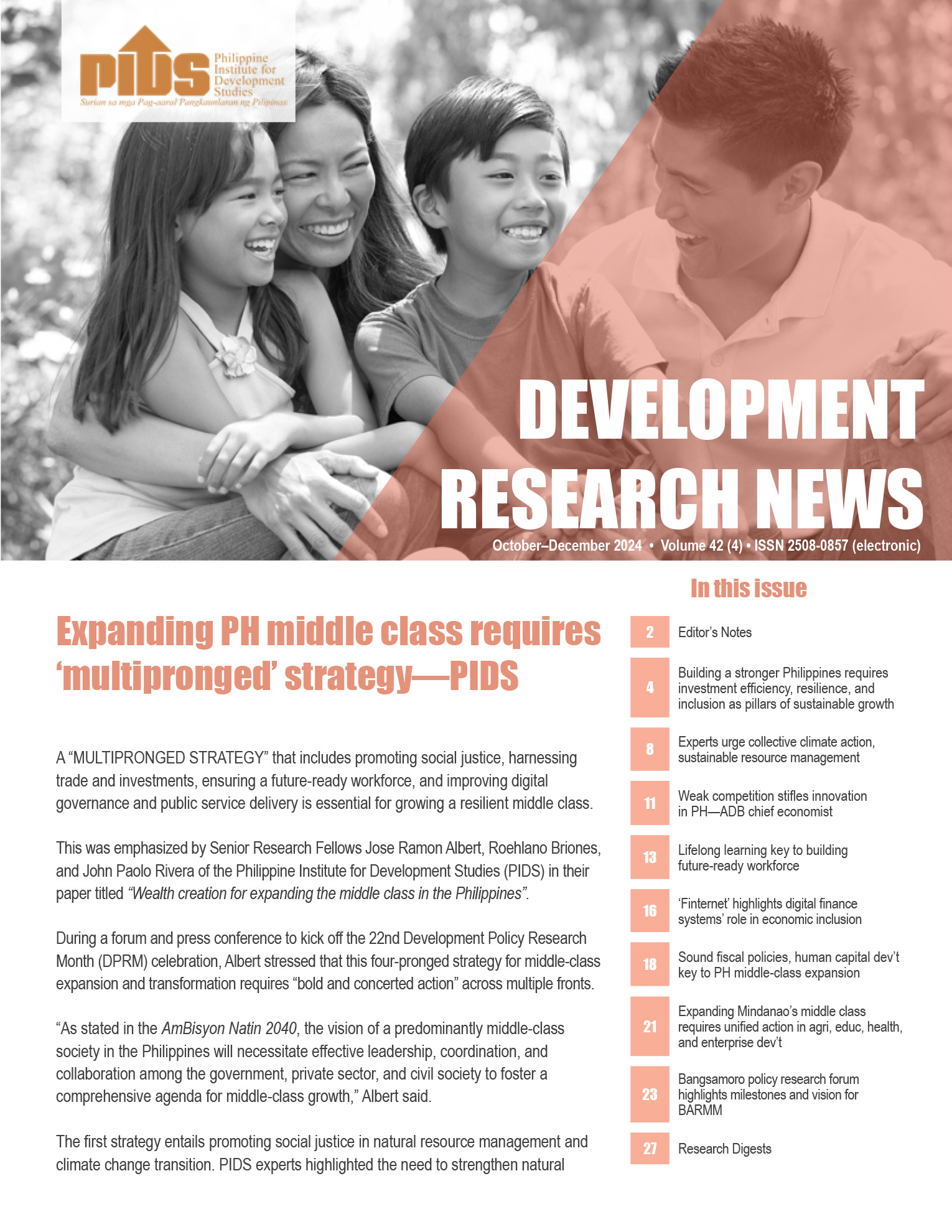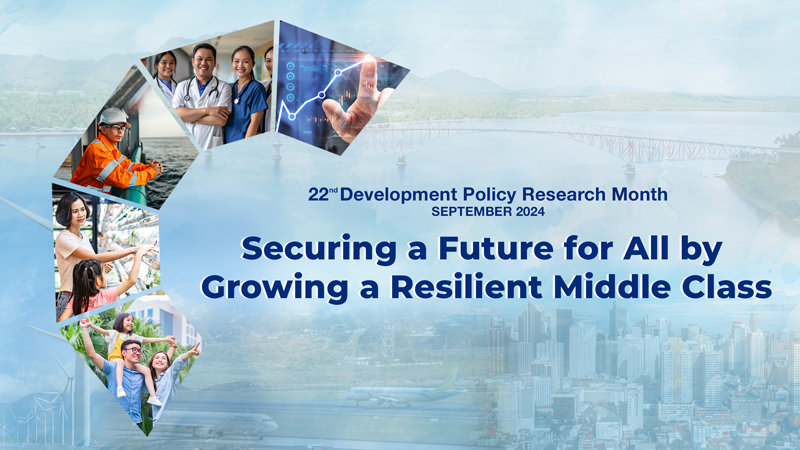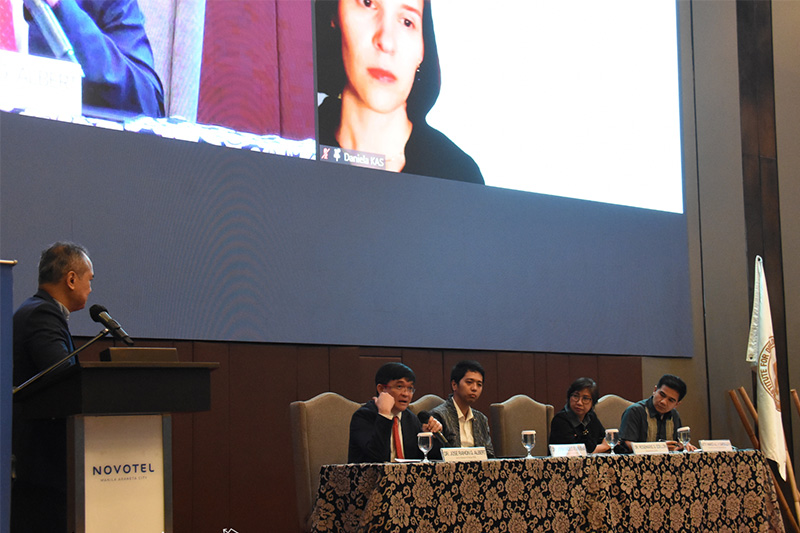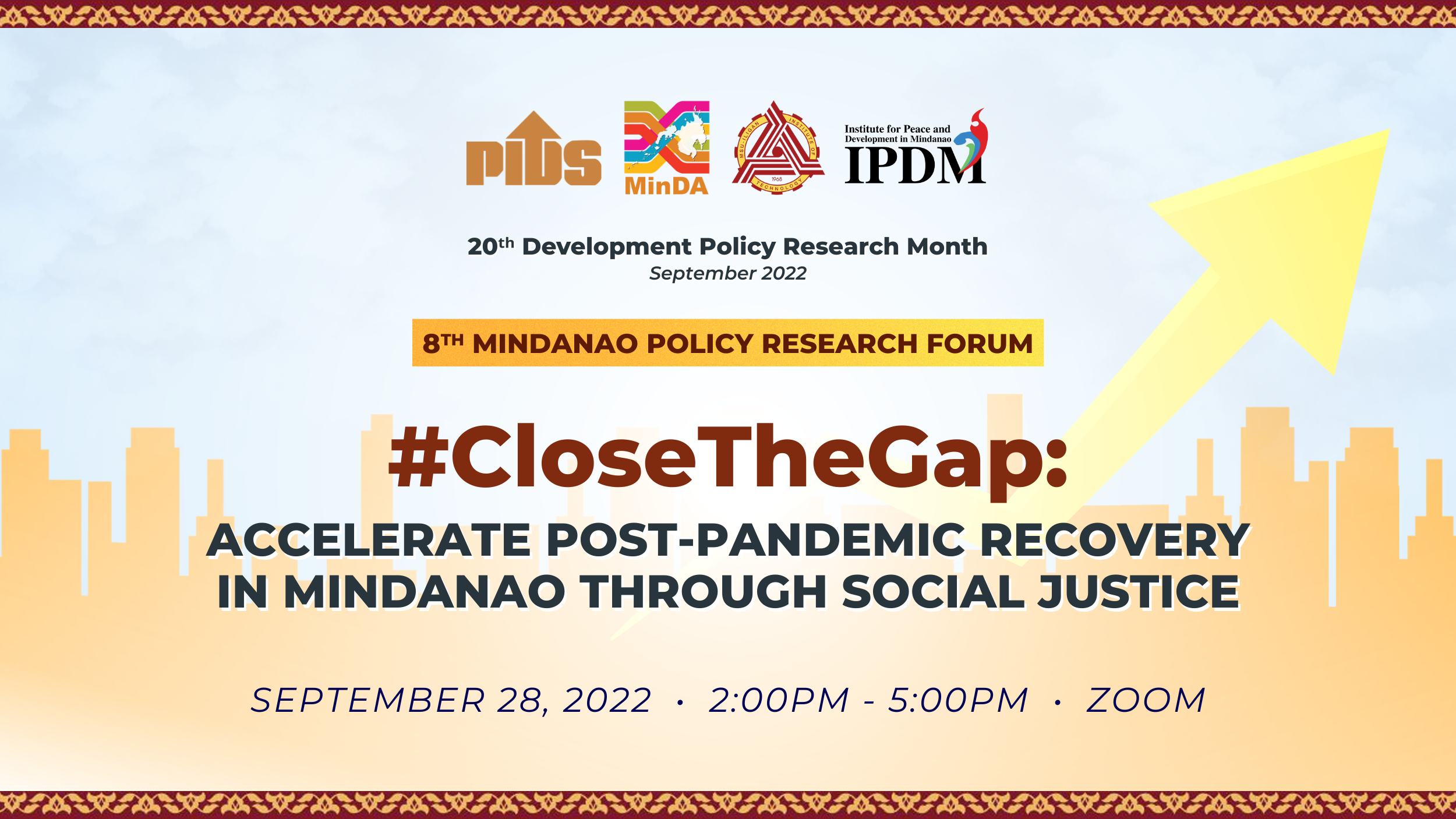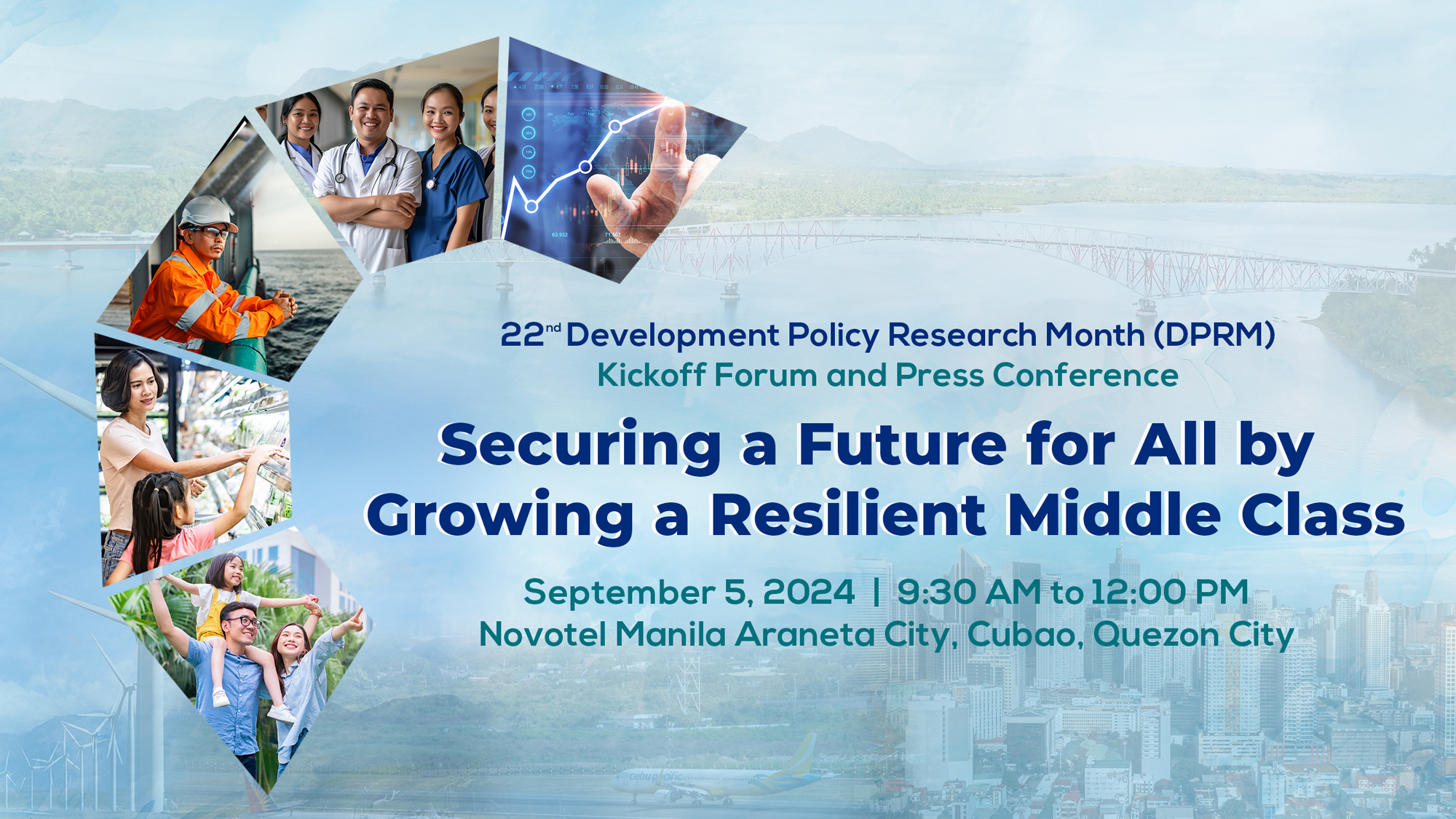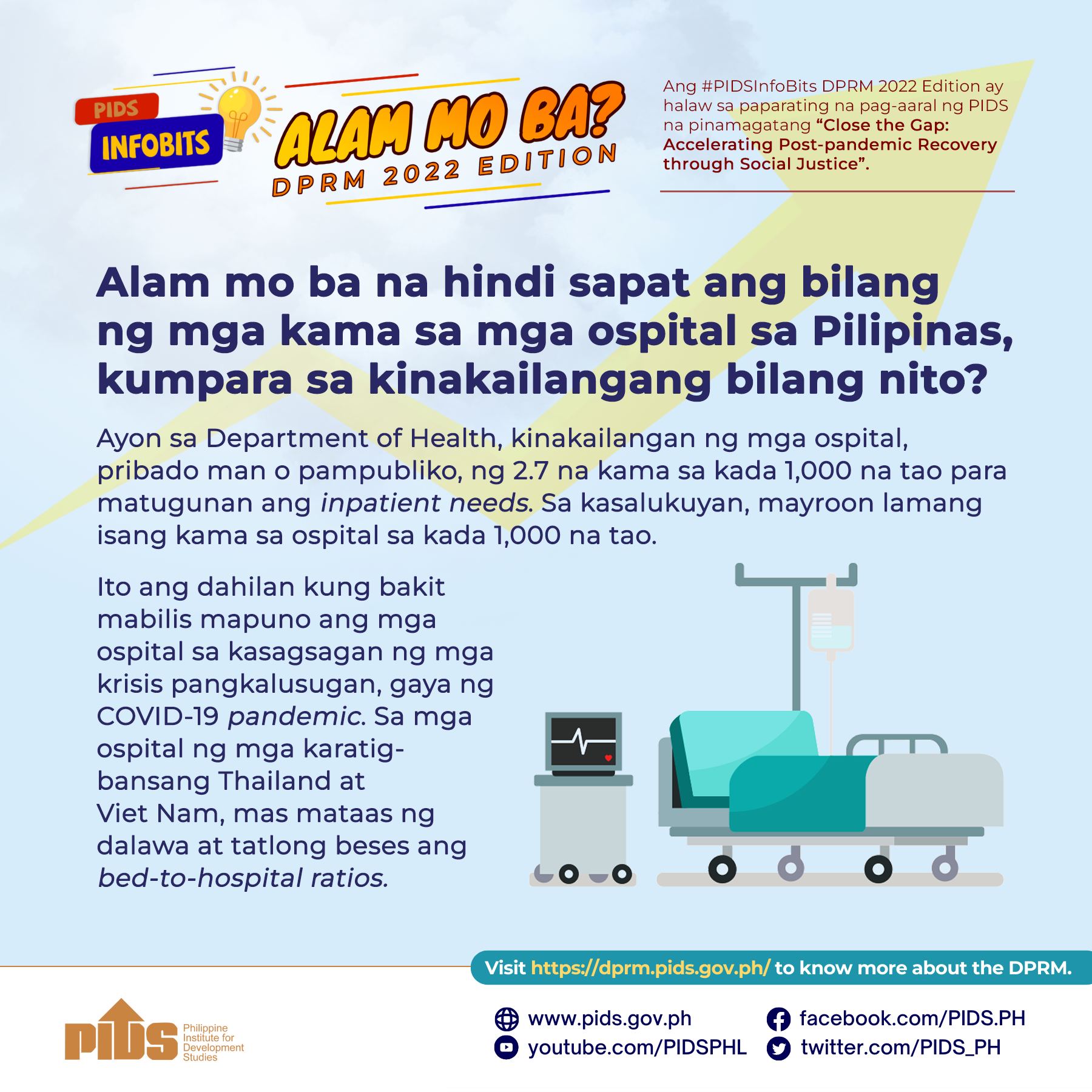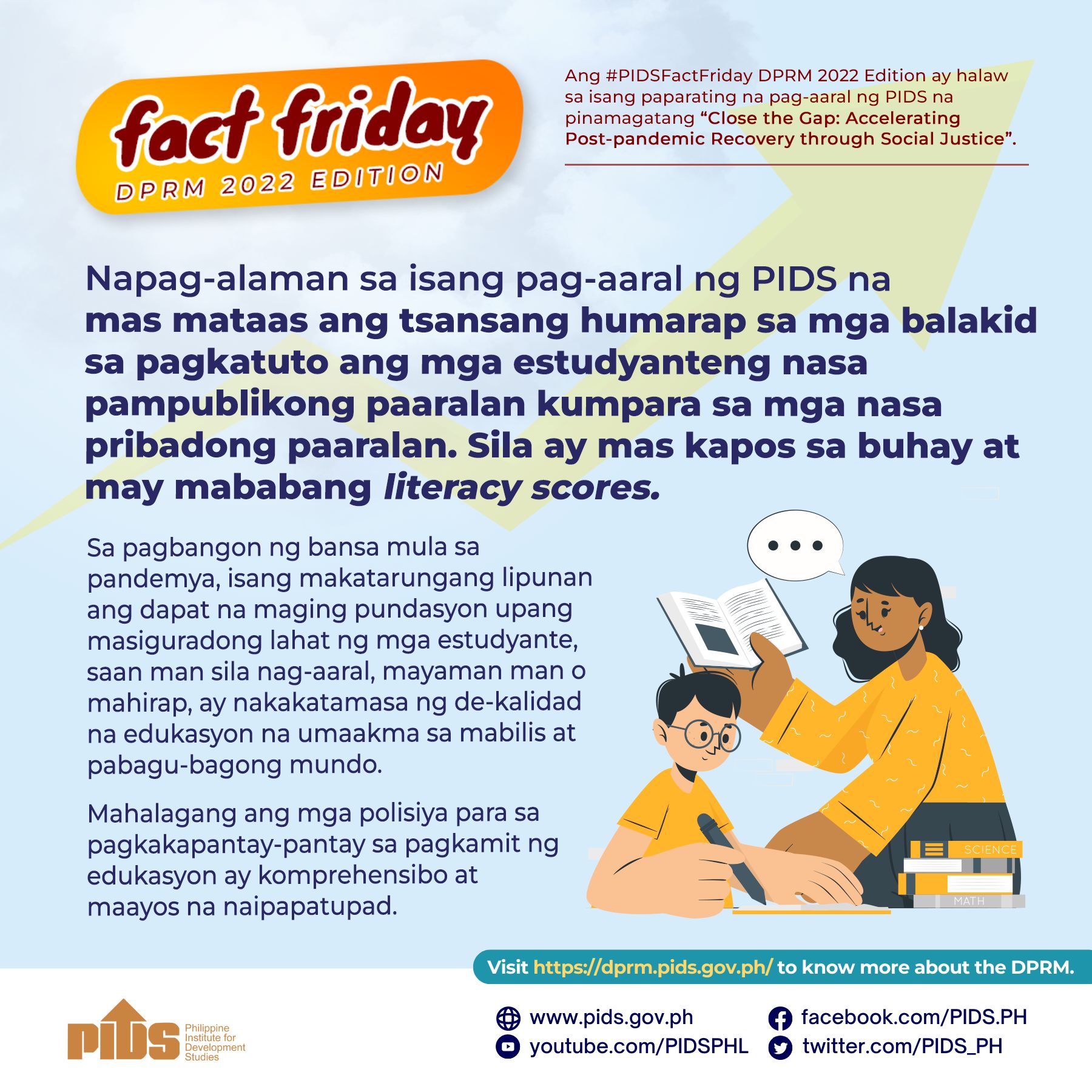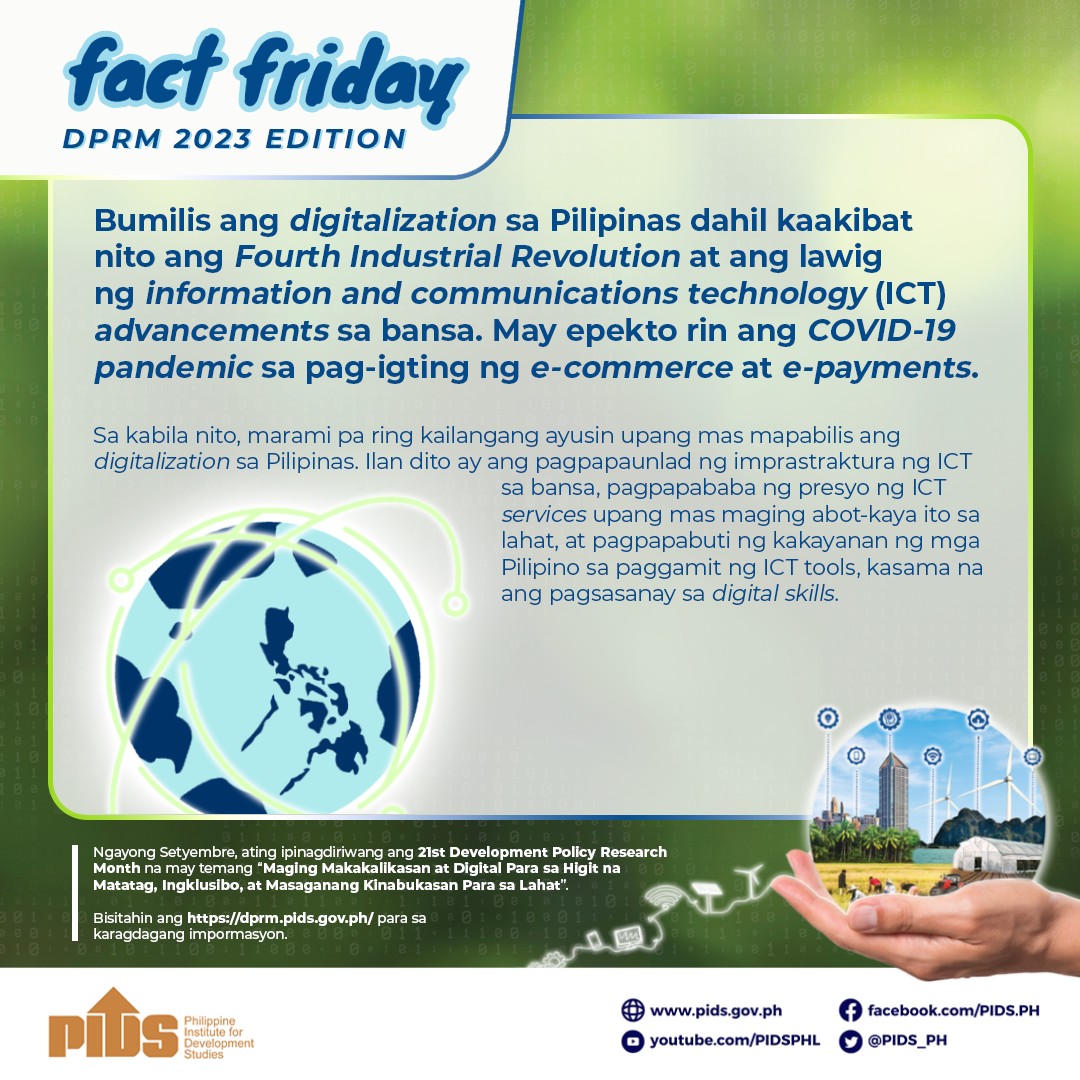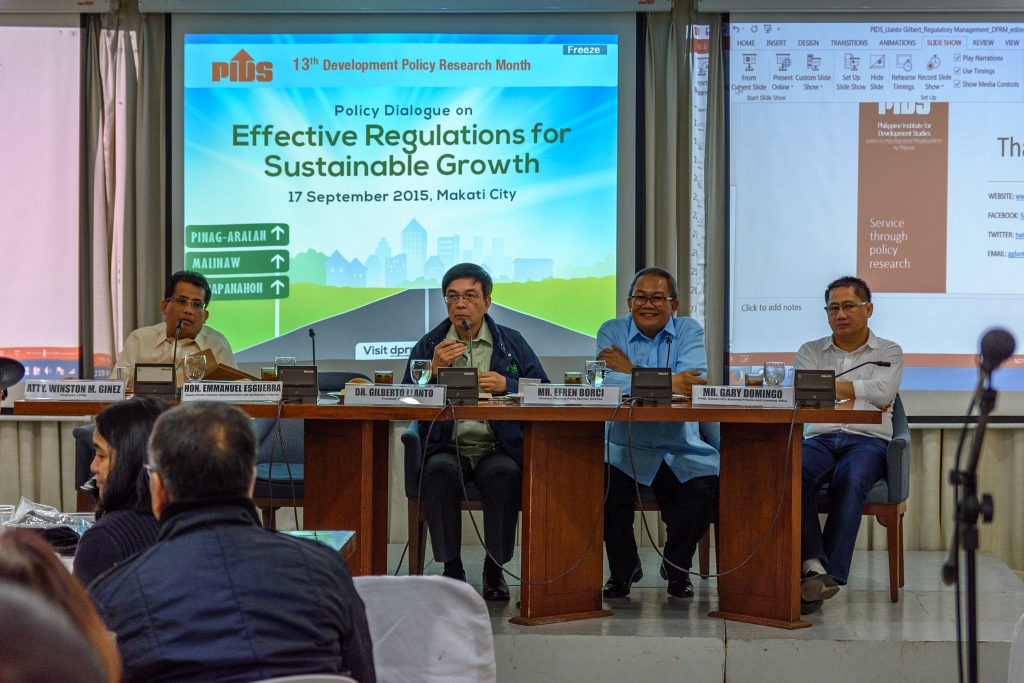
"There is a need to institutionalize good regulatory practice as we move to the ASEAN Economic Community."
Deputy Director-General Emmanuel Esguerra of the National Economic and Development Authority (NEDA) maintained that ensuring the quality of regulations through the building of a coherent regulatory system is crucial for the Philippines not only to keep up with its regional neighbors but also to build a sustainable and inclusive society--one where growth is felt at all levels.
In his keynote remarks at the Policy Dialogue on Effective Regulations for Sustainable Growth organized by state think tank Philippine Institute for Development Studies (PIDS) last September in Makati City to celebrate the 13th Development Policy Research Month (DPRM), Esguerra emphasized the need to review the country’s regulatory system to address barriers to trade and boost investments.
"Given that regulation is one of the three anchors along with tax and spending that governments draw on to achieve sustainable and inclusive growth, it is imperative for the Philippines to review its regulatory system, assess the environment for institutionalizing good regulatory practice, and formulate a regulatory framework to be able to pull alongside other ASEAN economies especially now that we are moving toward ASEAN integration," Esguerra stated.
He explained that this will help government in addressing behind-the-border issues that discourage foreign and domestic businesses to invest in the country.
Challenges to establishing an RMS
Meanwhile, PIDS President Gilberto Llanto highlighted the need for a strong and coherent regulation management system (RMS). According to Llanto, the country has the regulatory quality tools, the regulatory processes, the regulatory institutions, and the regulatory policies, which are the major elements of an RMS.
"What the country lacks is a central oversight body that will that will conduct regulatory impact assessment to determine the probable costs and benefits of proposed regulations. The absence of a formal RMS results in the lack of coherency of our regulations brought about by weak coordination across government agencies and regulatory bodies when it comes to creating regulatory policies. Implementing regulation also runs into trouble with usually weak institutions unable to carry out their regulatory mandate," Llanto noted.
Representatives from various regulatory bodies also shared their experiences as well as the innovations they introduced to come up with effective regulations. Speakers included Atty. Winston M. Ginez, chairperson of the Land Transportation Franchising and Regulatory Board, Mr. Efren Borci, administrator of the Maritime Industry Authority (MARINA), and Mr. Garry Domingo, head of the Quezon City Business Process and Licensing Office.
According to Atty. Ginez, LTFRB focuses on four regulatory issues– competition, innovation, productivity, and growth. To create better competition, the LTFRB has launched several regulatory reforms, which include requiring buses to strictly comply with its 15-year age limit for public utility vehicles and to install global positioning system (GPS) devices. The GPS device enables the LTFRB to determine whether the unit is following its authorized route and maintaining the prescribed speed limit.
A more popular regulatory innovation enforced by the LTFRB in the past year was the adoption of a regulatory framework for transportation network companies and transportation network vehicle services like Uber. According to Ginez, the Philippines is the first country to successfully develop a regulatory model for the sharing economy, which is expected to introduce more competition in the public utility vehicle sector.
In terms of regulatory principles, Ginez underscored the implementation of an open and transparent process, and agreed with Llanto on the need to conduct a regulatory impact assessment prior to the passing of a regulation. "Our goal is to simplify regulations, and to keep the public informed and engaged in the process through consultations and dialogues," he said.
Domingo of the Quezon City Business Permit and Licensing Office shared how they reduced the length of time to register businesses. The local government has streamlined regulations by putting up a business one-stop shop that integrates the registration processes of five government line agencies (Department of Trade and Industry, Bureau of Internal Revenue, Home Development Mutual Fund, Philippine Health Insurance Corporation, and Social Security System) into a single application system, cutting down the processing time from two weeks to 30 minutes. Future innovations include setting up of facilities for online and mobile money payments.
Meanwhile, Borci of MARINA gave an overview of the innovations in the four areas of the maritime industry, namely, overseas shipping, domestic shipping, development of maritime manpower, and ship building and ship repair.
Simplifying applications for ship operations, improving the use of nautical highways, allowing multiple-port calls for foreign ships, and granting domestic ships operational flexibility and permits that allow them to operate for the next three to five years were some of the innovations that MARINA introduced to streamline the regulatory process.
But Borci noted that regulatory issues remain. He emphasized the need to improve registration systems so that international ships can register in the country.
MARINA also focuses on the development and protection of seafarers given the increasing number of Filipinos who are engaged in this profession. According to Borci, 90 percent of the volume of international trade is carried at sea and a quarter of the manpower comes from the Philippines.
It is clear that regulatory reform is a continuous process. But as the anecdotes from each sector demonstrated, a centralized regulatory system, with strict conduct of regulatory tools like regulatory impact assessment across all sectors, would help ensure the quality of regulations, simplify the processes, and reduce the regulatory failures that inhibit sustainability and inclusiveness.
The dialogue, held last September 17, was the culmination of the 13th DPRM, an annual celebration aimed at promoting and drawing public awareness on the important role of policy research in nation-building. ###
If you'd like to know more about other events during the Development Policy Research Month, please visit the DPRM website for more details.
Deputy Director-General Emmanuel Esguerra of the National Economic and Development Authority (NEDA) maintained that ensuring the quality of regulations through the building of a coherent regulatory system is crucial for the Philippines not only to keep up with its regional neighbors but also to build a sustainable and inclusive society--one where growth is felt at all levels.
In his keynote remarks at the Policy Dialogue on Effective Regulations for Sustainable Growth organized by state think tank Philippine Institute for Development Studies (PIDS) last September in Makati City to celebrate the 13th Development Policy Research Month (DPRM), Esguerra emphasized the need to review the country’s regulatory system to address barriers to trade and boost investments.
"Given that regulation is one of the three anchors along with tax and spending that governments draw on to achieve sustainable and inclusive growth, it is imperative for the Philippines to review its regulatory system, assess the environment for institutionalizing good regulatory practice, and formulate a regulatory framework to be able to pull alongside other ASEAN economies especially now that we are moving toward ASEAN integration," Esguerra stated.
He explained that this will help government in addressing behind-the-border issues that discourage foreign and domestic businesses to invest in the country.
Challenges to establishing an RMS
Meanwhile, PIDS President Gilberto Llanto highlighted the need for a strong and coherent regulation management system (RMS). According to Llanto, the country has the regulatory quality tools, the regulatory processes, the regulatory institutions, and the regulatory policies, which are the major elements of an RMS.
"What the country lacks is a central oversight body that will that will conduct regulatory impact assessment to determine the probable costs and benefits of proposed regulations. The absence of a formal RMS results in the lack of coherency of our regulations brought about by weak coordination across government agencies and regulatory bodies when it comes to creating regulatory policies. Implementing regulation also runs into trouble with usually weak institutions unable to carry out their regulatory mandate," Llanto noted.
Representatives from various regulatory bodies also shared their experiences as well as the innovations they introduced to come up with effective regulations. Speakers included Atty. Winston M. Ginez, chairperson of the Land Transportation Franchising and Regulatory Board, Mr. Efren Borci, administrator of the Maritime Industry Authority (MARINA), and Mr. Garry Domingo, head of the Quezon City Business Process and Licensing Office.
According to Atty. Ginez, LTFRB focuses on four regulatory issues– competition, innovation, productivity, and growth. To create better competition, the LTFRB has launched several regulatory reforms, which include requiring buses to strictly comply with its 15-year age limit for public utility vehicles and to install global positioning system (GPS) devices. The GPS device enables the LTFRB to determine whether the unit is following its authorized route and maintaining the prescribed speed limit.
A more popular regulatory innovation enforced by the LTFRB in the past year was the adoption of a regulatory framework for transportation network companies and transportation network vehicle services like Uber. According to Ginez, the Philippines is the first country to successfully develop a regulatory model for the sharing economy, which is expected to introduce more competition in the public utility vehicle sector.
In terms of regulatory principles, Ginez underscored the implementation of an open and transparent process, and agreed with Llanto on the need to conduct a regulatory impact assessment prior to the passing of a regulation. "Our goal is to simplify regulations, and to keep the public informed and engaged in the process through consultations and dialogues," he said.
Domingo of the Quezon City Business Permit and Licensing Office shared how they reduced the length of time to register businesses. The local government has streamlined regulations by putting up a business one-stop shop that integrates the registration processes of five government line agencies (Department of Trade and Industry, Bureau of Internal Revenue, Home Development Mutual Fund, Philippine Health Insurance Corporation, and Social Security System) into a single application system, cutting down the processing time from two weeks to 30 minutes. Future innovations include setting up of facilities for online and mobile money payments.
Meanwhile, Borci of MARINA gave an overview of the innovations in the four areas of the maritime industry, namely, overseas shipping, domestic shipping, development of maritime manpower, and ship building and ship repair.
Simplifying applications for ship operations, improving the use of nautical highways, allowing multiple-port calls for foreign ships, and granting domestic ships operational flexibility and permits that allow them to operate for the next three to five years were some of the innovations that MARINA introduced to streamline the regulatory process.
But Borci noted that regulatory issues remain. He emphasized the need to improve registration systems so that international ships can register in the country.
MARINA also focuses on the development and protection of seafarers given the increasing number of Filipinos who are engaged in this profession. According to Borci, 90 percent of the volume of international trade is carried at sea and a quarter of the manpower comes from the Philippines.
It is clear that regulatory reform is a continuous process. But as the anecdotes from each sector demonstrated, a centralized regulatory system, with strict conduct of regulatory tools like regulatory impact assessment across all sectors, would help ensure the quality of regulations, simplify the processes, and reduce the regulatory failures that inhibit sustainability and inclusiveness.
The dialogue, held last September 17, was the culmination of the 13th DPRM, an annual celebration aimed at promoting and drawing public awareness on the important role of policy research in nation-building. ###
If you'd like to know more about other events during the Development Policy Research Month, please visit the DPRM website for more details.

